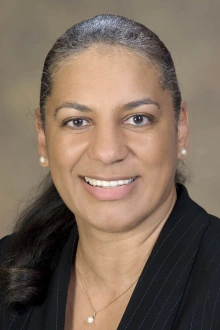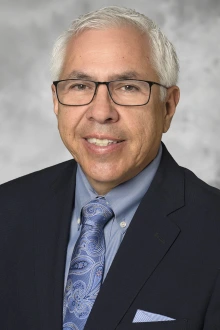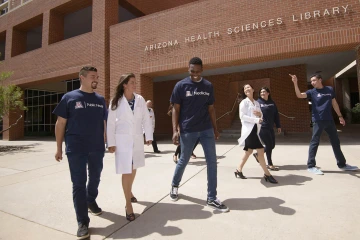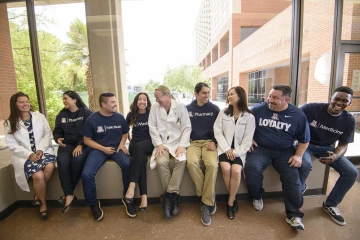How Education and Research Can Help Fix Health Care Inequity
With robust diversity and inclusion efforts, UArizona Health Sciences is establishing avenues to create equity in medicine.

UArizona Health Sciences takes a multipronged approach to building a culturally competent and diverse workforce across health professions.
Over the course of the COVID-19 pandemic, the disease has disproportionately affected people based on race and ethnicity. The U.S. Centers for Disease Control and Prevention reports that African American, non-Hispanic people are dying at nearly twice the rate and are being hospitalized at almost three times the rate of white, non-Hispanic people.

Patricia Harrison-Monroe, PhD
There also is growing concern about greater hesitancy among African American adults regarding the COVID-19 vaccine. In March, the Kaiser Family Foundation COVID-19 Vaccine Monitor, an ongoing research project tracking the public’s attitudes and experiences with COVID-19 vaccinations, found that one-quarter of African American adults say they still want to “wait and see” how the vaccine works before getting vaccinated, which is somewhat higher than the share of white adults who say the same.
Patricia Harrison-Monroe, PhD, is vice chair of the Department of Psychiatry and a Diversity Champion at the College of Medicine – Tucson. Diversity Champions represent their department in ensuring diversity and inclusion metrics are being addressed and facilitate institutional efforts to ensure that every member of the college is trained on topics that illustrate the benefits of diversity.
She and Francisco Moreno, MD, professor of psychiatry and University of Arizona Health Sciences associate vice president for equity, diversity and inclusion, are both deeply involved in diversity, equity and inclusion initiatives at UArizona. Here, they discuss the reasons behind health care inequities, and how UArizona Health Sciences and the Colleges of Medicine’s diversity and inclusion efforts are establishing avenues to create equity in medicine.

Francisco Moreno, MD
How has race affected medical care?
Dr. Harrison-Monroe: One the most distressing revelations to come out of this pandemic is the confirmation of what was already known: that in the United States, historically marginalized groups are disproportionately impacted by a lack of access to appropriate health care, resulting in substantially higher morbidity and mortality.
When your health is already compromised, higher infection rates, hospitalizations and deaths are the inevitable result. Coupled with distrust in the health care system and a reluctance to be vaccinated based on innumerable examples of ethical and medical abuses, African Americans are particularly vulnerable to the ravages of this virus.
What are some ways the health care field needs to evolve when it comes to addressing the concerns of bias in access and care?
“Of all the forms of inequality, injustice in health is the most shocking and inhumane.”Dr. Martin Luther King Jr.
Dr. Moreno: There are multiple approaches that must be taken into consideration, including:
- Increasing the diversity of the workforce.
- Improving the cultural proficiency of all providers and programs by improving curricular content reflective of the overall population and creating training experiences with communities and providers who serve the most disadvantaged.
- Increasing the amount of research that addresses social determinants of health and demographic variables while ensuring a more diverse research participation.
Dr. Harrison-Monroe: It also is imperative that providers acknowledge their own biases and learn to engage with communities of color in a proactive and antiracist manner, recognizing the legacy of medical mistreatment shaping their patients’ perceptions of the care they should expect.
How is UArizona Health Sciences addressing racial disparities in medical and mental health care?
Dr. Moreno: The Office of Equity, Diversity and Inclusion exists to collaborate with UArizona Health Sciences' colleges and centers to support several programs that promote diversity of the health profession’s workforce by identifying, supporting and preparing students who come from underrepresented groups.

Diversity, inclusion and equity efforts at UArizona Health Sciences feature multiple programs to fill the pipeline with underrepresented minority students.
There are programs for students in middle school (Pharm Camp) and high school (MedStart), as well as a college transition program (BRIDGE) and an undergraduate research program (Frontera) at the university. Additionally, learning services and mental health wellness services are available to students and faculty.
Other programs expand educational and research opportunities to address the service needs of disadvantaged communities and promote health equity. These include the Graduate Medical Education Health Disparities Track, Medical Spanish Bilingual Training, Rural Health Professions Programs, Commitment to Underserved Student Track Program, Global Health in Low and Middle Income Countries, and collaborations with the Arizona Area Health Education Centers.

When health care integrates diverse perspectives, the ability to serve all patients and communities improves.
Dr. Harrison-Monroe: Within the College of Medicine – Tucson, multiple initiatives have brought a very deliberate spotlight on the need for change. These include a holistic medical school admissions process to encourage students who are underrepresented in medicine to consider becoming physicians, and a focus on implicit bias, which may impact the recruitment and selection process of residents, fellows and faculty.
Additionally, programs such as the Pre-Medical Admissions Pathway help students experiencing unique or greater-than-average challenges prepare to become competitive medical school applicants.
Under the leadership of the college's Office of Diversity, Equity and Inclusion, multiple committees help faculty, students, residents, fellows and staff remain focused on pursuing antiracism in medicine.
How does cultural competency reduce discrimination and how is it integrated into medical student, resident and fellow training?
Dr. Harrison-Monroe: Being part of a diverse group of students and practitioners that values and integrates everyone’s perspectives and experiences improves everyone’s ability to serve and appreciate the unique needs of all patients and communities. Becoming aware of our unconscious bias and how it influences our behaviors allows us to move toward more egalitarian, conscious and intentional practices.

